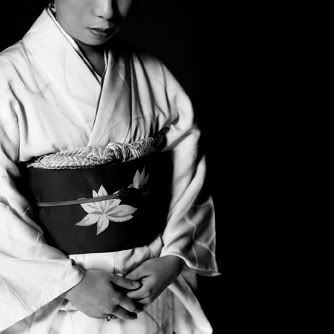Japantoday: http://www.japantoday.com/jp/news/423498
Telegraph UK: http://www.telegraph.co.uk/news/main.jhtml?xml=/news/2008/01/07/wgeisha107.xml
and debito's blog: http://www.debito.org/index.php/?p=876
Japan’s first ever foreign geisha
Courtesy of Sayuki
For the first time in the 400 year history of the geisha, a Westerner has been accepted, and on December 19, will formally debut under the name Sayuki.
Sayuki is specialized in social anthropology, a subject which requires anthropologists to actually experience the subject they are studying by participating in the society themselves.
Sayuki has been doing anthropological fieldwork in Asakusa - one of the oldest of Tokyo’s six remaining geisha districts - for the past year, living in a geisha house (okiya), and participating in banquets as a trainee. She has been training in several arts, and will specialize in yokobue (Japanese flute).
Sayuki took an MBA at Oxford before turning to social anthropology, and specializing in Japanese culture. She has spent half of her life in Japan, graduating from Japanese high school, and then graduated from Japan’s oldest university, Keio. Sayuki has lectured at a number of universities around the world, and has published several books on Japanese culture. She is also an anthropological film director with credits on NHK, BBC, National Geographic Channel programmes.
http://www.sayuki.netBut oh wait, even after sending out her press release to debito, and giving interviews about being "inducted into the mysteries of geisha," she wants you to forget her real name and hope you can't google her using the clues she's already provided.
SAYUKI has said:
(It has been a very long road to becoming a geisha, and has taken several years of preparation, an enormous investment, and considerable perseverance. Whatever you are imagining geisha life is like, it is a great deal harder than you know.)
I had made a decision to keep my life as an academic and my life as a geisha as separate as possible. Confusing the two could have very unwelcome implications for my my fieldwork now, particularly when I have struggled so hard to begin. I would be very grateful if those people speculating about my identity could please not do so and remove the posts.
This is purely anthro conjecture, from one card-carrying anthropologist to another, but...
To get a BA in anthro (in the States at least) you have to take at least one ethnographic methodology course, and that usually means conducting some kind of participant-observation study. Now clearly you've already written books on your first-hand research into Japanese insurance corporations.
One of the pitfalls of participatory research is not being able to separate your various selves - academic, political, familial, real-life, what have you - from the work. It's sucks, but you can't always hole yourself up in your tent and make notes in some optimal Boasian environment. Gay and lesbian researchers don't lie about their sexual orientation when the issue comes into play. Feminist researchers can't mask or hide their political viewpoints. Non-native 'outsider' anthropologists usually have to acknowledge that they just don't look like the population they're supposed to be studying. It will all come out in the work anyway, so what's the big deal about full disclosure? Is it going to compromise an already compromised identity?
Maybe anthro in the UK is just done differently, but what you ARE is hard to separate from what you are DOING. Is it a question of motivation? I can understand if you want to become a geisha because you genuinely want to become a geisha. Cool. I can understand if you want to become a geisha so you can write a book. That's fine too.
The public doesn't have to speculate. The 'secret' identity is already out, published by legitimate news sources no less. As far as I'm concerned, she opened the door on identity.
Discussion, speculation, critique - these are all sorts of 'mean' things anthropologists do to one another in their circles. If you put up a good defense in getting your doctorate, the greater public will be a cakewalk.

